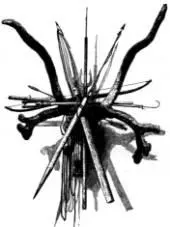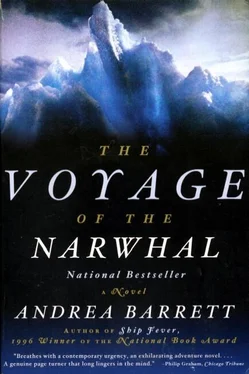“I’m sorry,” Alexandra said.
“My father must be rolling in his grave. But it can’t be helped, can it?”
“You could go back,” she pointed out. “It is your house.”
“There’s something…” he said. “I can’t explain it, but I know as surely as I’ve ever known anything that Lavinia can’t be happy with Zeke in my presence. She thinks I’m judging her, she doesn’t understand it’s him, that I don’t trust him."
“Then we have to live like this for a while,” Alexandra said. “I suppose. They’re building a house of their own, they’ll be gone in time.”
“In time for what?” He thought of Annie and her little boy. “Are they really sick?”
“They didn’t look well,” she said. “But I don’t know what’s wrong with them.”
“Zeke,” he said. “Zeke… Copernicus offered to let us work at his new studio, but really there isn’t room without crowding his friends. He said that when Zeke got back from Washington, he was all puffed up from meeting politicians and members of the Smithsonian Institution, and that everyone was pressing him to exhibit Annie and Tom. A sort of lecture tour around the lyceum halls of the Northeast. One night a ventriloquist or a phrenologist, the next some itinerant professor giving lessons in physiology or showing wax models of Egyptian ruins. The next Zeke in his polar-bear pants, exhibiting Annie like another Hottentot Venus. It’s such a dreadful idea, but Copernicus says he’s going to do it. He’s going to hold the first exhibition right here in Philadelphia. But if they’re already sick…”
“Do you think that will stop him?”
“Nothing stops him,” Erasmus said. “Nothing ever does. If he gives a lecture here, will you go with me? I have to see what he does.”
“If you want,” Alexandra said. “Of course I’ll come. And I was thinking, in the meantime — what about asking Linnaeus and Humboldt for some space at the engraving firm? All we’d need are two desks near each other. There must be a corner they could spare.”
She was looking at the river, not at him, but he could see the longing on her face. “I can’t live like this,” she said. “Not after having a chance to do real work. I can’t stand this.”
“I’ll ask them,” he promised. “If it doesn’t work out, I’ll rent us a workroom someplace else.”
He let his fingers creep over her knuckles. Her hands were smooth and white, the fingernails clipped short; although her palms were small her fingers were unusually long and her nails, he saw, were deeply arched.
Later he’d think of this as the first moment he saw himself back in the arctic. Not a dark dream, like those he’d had during his first days home, but a bright waking vision: the muddy Schuylkill turned into a glacial stream; the ducks turned into murres and dovekies; the limp, moist foliage dwarfed into a crisp tangle of willows. Beside him Alexandra, who’d had only his stories from which to build her vision, dreamed in less detail. But she imagined a ship passing through dense ice, both of them scouting a route from the bow as the floes glided past.
10Specimens of the Native Tribes (September 1857)
Miserable, yet happy wretches, without one thought for the future, fighting against care when it comes unbidden, and enjoying to the full their scanty measures of present good! As a beast, the Esquimaux is a most sensible beast, worth a thousand Calibans, and certainly ahead of his cousin the Polar bear, from whom he borrows his pantaloons.
— ELISHA KENT KANE, Arctic Explorations: The Second Grinnell Expedition in Search of Sir John Franklin, 1853, ‘54, ‘55 (1856)

H ere in the theater’s gallery, near the prostitutes scattered like iridescent fish through the shoals of dark-clothed men, Alexandra felt drab in her brown silk dress. Two seats down from her, a woman in a chartreuse gown with lemon-trimmed flounces was striking a deal with a pleasant-looking man. They would meet on the landing, Alexandra heard them agree. Directly after the lecture. The man’s voice dropped and the woman shook her head, shivering the egret feathers woven into her hair. “Twenty dollars,” she said. The man nodded and disappeared, leaving Alexandra to marvel at the transaction.
“There must be a thousand people,” Erasmus said, scanning the crowd. “Maybe more.”
“It’s frightening,” she said. “How good Zeke is at promoting himself.”
All around the city, on lampposts and tavern doors, in merchants’ windows and omnibuses, posters advertised the exhibition. A clumsy woodcut showed Zeke holding a harpoon and Annie a string of fish, Tom peeping out from behind her flared boots. In the background were mountains cut by a fjord, and above those a banner headline: MY LIFE AMONG THE ESQUIMAUX. A caption touted the remarkable discoveries made by Zechariah Voorhees:
Two Fine Specimens Of The Native Tribes!
More Exotic Than The Sioux And Fox Indians Exhibited By
George Catlin In London And Paris!
See The Esquimaux Demonstrate Their Customs!
Zeke had run a smaller version in the newspaper and mailed invitations to hundreds of his family’s friends and business associates — organizing this first exhibition, Alexandra thought, like a military campaign. Ahead of him lay Baltimore, Washington, Richmond, New York, Providence, Albany, Boston.
Erasmus said, “Can you see Lavinia?” and Alexandra, scouting the boxes on the second tier, finally spotted her dead center, flanked by Linnaeus and Humboldt and Zeke’s parents and sisters. She was touching her hair then her cheek then her brooch then her nose, turning her head from side to side as if the mood of the entire audience were expressing itself through her. Everyone, Alexandra thought, made nervous by this month’s chain of disasters. Across the ocean, off the coast of Ireland, the telegraph cable being laid with such fanfare had broken. Two trains had crashed south of Philadelphia, killing several passengers; last week a steamship on its way to New York from Cuba had sunk. Each of these seemed to heighten the financial panic set off by a bank failure in Ohio. Banks were closing everywhere; the stock exchange was in an uproar. The papers were full of news about bankrupt merchants and brokers. Alexandra’s own family, who had no money to lose, hadn’t been touched so far, and the engraving firm seemed stable. But Erasmus, whose income came primarily from his father’s investments, had suffered some losses. And Zeke’s father’s firm was in trouble, which suddenly made Zeke’s future — and Lavinia’s as well — uncertain. Suddenly it mattered what Zeke charged for the exhibition tickets, and how many tickets were sold. The theater was full of people desperate for distraction.
In the glow of the gaslights Zeke strode out in full Esquimaux regalia, adjusted the position of two large crates, and took his place at the podium. The roar of applause was startling, as was the ease with which he spoke. If he had notes, Alexandra couldn’t see them. Swiftly, eloquently, he sketched for the audience an outline of the voyage of the Narwhal, making of the confused first months a spare, dramatic narrative.
Their first sights of Melville Bay and Lancaster Sound, their encounters with the Netsilik and their retrieval of the Franklin relics; the discovery of the Resolute and their stormy passage up Ellesmere until they were frozen in; their long winter and the visit of Ootuniah and his companions; the first trip to Anoatok. No mention, Alexandra noticed, of Dr. Boerhaave’s death, nor of the other men who’d died: nor of Erasmus. It was “I” all the time, “I” and “me” and “mine”; occasionally “we” or “my men.” No names, only him. Beside her, Erasmus fidgeted.
Читать дальше
Конец ознакомительного отрывка
Купить книгу













